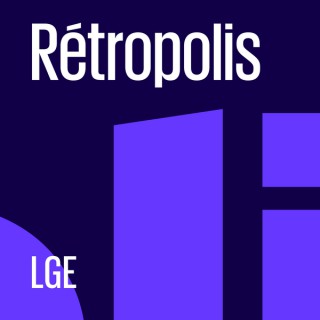Podcast appearances and mentions of Paul Misraki
- 11PODCASTS
- 15EPISODES
- 59mAVG DURATION
- ?INFREQUENT EPISODES
- Nov 25, 2025LATEST

POPULARITY
Best podcasts about Paul Misraki
Latest podcast episodes about Paul Misraki
Panorama BO #32 : Le Paysage musical d'Orson Welles
par Benoit Basirico Cinezik Radio sur Cinezik.fr A l'occasion de la rétrospective que lui consacre la Cinémathèque Française du 8 octobre 2025 au 11 janvier 2026, voici notre plongée dans l'univers sonore d'Orson Welles, un véritable architecte du son, au fil d'une carrière faite de génie et de conflits avec les studios, autour de chefs-d'œuvre comme “Citizen Kane”, “La Soif du Mal” et “Falstaff”. Des partitions conçues autour de motifs récurrents et d'orchestrations sombres (Bernard Herrmann), d'ambiances jazz vénéneuses émanant des juke-box (Henry Mancini), de thèmes mélancoliques remixés et fragmentés par le réalisateur lui-même (Paul Misraki), de musiques torturées pour exprimer l'oppression (Jean Ledrut dans Le Procès), de nappes sonores vibrantes et nerveuses (Angelo Francesco Lavagnino) et de jazz espiègle ou atonal (Michel Legrand). Se croisent la révolution du film noir (Citizen Kane, La Dame de Shanghai), l'adaptation radicale des tragédies shakespeariennes (Macbeth, Othello, Falstaff), le cauchemar bureaucratique kafkaïen (Le Procès) et les essais-documentaires vertigineux (Vérités et Mensonges), témoignant de la quête perpétuelle de contrôle artistique de ce géant du cinéma. Programme des B.O : De l'autre côté du vent (Orson Welles, 2018) - Michel Legrand Vérités et Mensonges (Orson Welles, 1973) - Michel Legrand La Soif du Mal (Orson Welles, 1958) - Henry Mancini Le Procès (Orson Welles, 1962) - Jean Ledrut Citizen Kane (Orson Welles, 1941) - Bernard Herrmann La Splendeur des Amberson (Orson Welles, 1942) - Bernard Herrmann Le Criminel (Orson Welles, 1946) - Bronisław Kaper La Dame de Shanghai (Orson Welles, 1947) - Heinz Roemheld Macbeth (Orson Welles, 1948) - Jacques Ibert Othello (Orson Welles, 1951) - Angelo Francesco Lavagnino & Alberto Barberis Dossier Secret (Orson Welles, 1955) - Paul Misraki Falstaff (Orson Welles, 1965) - Angelo Francesco Lavagnino Le Troisième Homme (Carol Reed, 1949) - Anton Karas It's All True (Orson Welles (reconstruit), 1993) - Jorge Arriagada Too Much Johnson (Orson Welles, 1938) - Paul Bowles
MAR 386. Noviembre Sci-Fi: Nuestras 10 Películas Favoritas de Ciencia-Ficción en ByN
Las primeras joyas de la sci-fi en la Historia del Cine son títulos fundacionales del género y del séptimo arte, que carecen de color, pero no de interés. ¿Quieres conocer nuestras 10 favoritas? Escúchanos y te hablaremos de ellas con detalle Más información sobre Quatermass en: https://www.ivoox.com/marcianos-232-el-ciclo-quatermass-nigel-kneale-audios-mp3_rf_69955494_1.html Con Jose Ceballos, Eusebio Arias y Sergio Valencia Edición: Jose Ceballos Música: Bernard Herrmann, Jamez Dahl, Akira Ifukube, James Bernard, Carmen Dragon, Hans J. Salter, Paul Misraki, Ubaldo de Lío, Aníbal Troilo, Astor Piazzolla y Eglo Records Únete a nosotros en Telegram: t.me/redmarciana ¿Quieres anunciarte en este podcast? Hazlo con advoices.com/podcast/ivoox/311035 Escucha el episodio completo en la app de iVoox, o descubre todo el catálogo de iVoox Originals
Itinéraires de l'inquiétude : Le phénomène des sectes et des sociétés secrètes (1ère diffusion : 12/03/1967)
durée : 01:16:09 - Les Nuits de France Culture - par : Albane Penaranda - Par Marianne Monestier - Avec Henri-Charles Chéry (catholique dominicain), Pierre Xénophon-Hadjidimou (sociologue de l'université d'Athènes), Pierre Mariel (écrivain), le Dr. Philippe Encausse (auteur et franc-maçon), Usha Chatterji (écrivaine et sociologue), Arnaud Desjardins (cinéaste et ethnologue), Marianne Kohler (journaliste), Michèle Curcio (journaliste), Robert Charroux (journaliste) et Paul Misraki (compositeur et auteur) - Réalisation Arlette Dave
Georges Brassens : "Sur une île déserte, j'emporterais Charles Trenet bien sûr"
durée : 00:30:59 - Les Nuits de France Culture - par : Philippe Garbit - En 1969, dans "Les mille et une chansons" Georges Brassens évoquait ses goût musicaux, Paul Misraki, Jean Tranchant, Ray Ventura et ses collégiens, Mireille et, bien entendu, Charles Trenet. - invités : Georges Brassens chanteur, auteur, compositeur (1921-1981)
Soyez les bienvenus 12/51 : Mylène Demongeot (1ère diffusion : 03/04/1959)
durée : 00:59:59 - Les Nuits de France Culture - par : Philippe Garbit, Albane Penaranda, Mathilde Wagman - Par Marcel Dynine - Avec Mylène Demongeot, Paul-Émile Victor, Michel Boisrond, Alain Delon, Line Renaud, Mouloudji, Paul Misraki, Louis Ducreux, Michel Magne, Jean-Noël Grinda, Claude Brulé et Annie Girardot - Réalisation Albert Riéra - réalisation : Virginie Mourthé
Cabaret 42ème rue : « Normandie » de Paul Misraki par les Frivolités parisiennes
durée : 00:59:09 - Rediffusion : « Normandie » de Paul Misraki par Les Frivolités Parisiennes - par : Laurent Valière - Retour sur notre premier concert en public, nous recevions l'orchestre des Frivolités parisiennes et la troupe au complet de leur spectacle « Normandie », l'opérette de 1936 de Paul Misraki. - réalisé par : Emmanuel Benito
Cabaret 42e rue : « Normandie » de Paul Misraki par les Frivolités parisiennes
durée : 00:58:37 - Cabaret 42ème rue : « Normandie » de Paul Misraki par les Frivolités parisiennes - par : Laurent Valière - Pour notre premier concert en public, nous recevons l’orchestre des Frivolités parisiennes et la troupe au complet de leur spectacle « Normandie », l’opérette de 1936 de Paul Misraki, et nous recevons le fils du compositeur. - réalisé par : Fabien Fleurat
Comentários sobre o Comissário Jules Maigret, criação do escritor Georges Simenon, e suas adaptações para o cinema estreladas pelo Jean Gabin: ASSASSINOS DE MULHERES (1958), O CASTELO DO MEDO (1959), ambos de Jean Delannoy, e INSPETOR MAIGRET ACERTA (1963) de Gilles Grangier. TRILHA SONORA: "Ca ne sert à rien" - Paule Desjardins (ASSASSINO DE MULHERES); e trechos da trilha de Paul Misraki para ASSASSINO DE MULHERES --- Send in a voice message: https://anchor.fm/carlosquintao/message
Soyez les bienvenus 12/51 : Mylène Demongeot (1ère diffusion : 03/04/1959)
durée : 01:00:00 - Les Nuits de France Culture - par : Philippe Garbit, Albane Penaranda, Mathilde Wagman - Par Marcel Dynine - Avec Mylène Demongeot, Paul-Émile Victor, Michel Boisrond, Alain Delon, Line Renaud, Mouloudji, Paul Misraki, Louis Ducreux, Michel Magne, Jean-Noël Grinda, Claude Brulé et Annie Girardot - Réalisation Albert Riéra - réalisé par : Viginie Mourthé
Chansomania 241 Paul Misraki 4 Mai 2019
Impossible de ne pas connaitre, a minima, quelques unes des oeuvres de Paul Misraki. Christophe Misraki, son fils, est avec nous en interview pour nous parler de ce compositeur prolifique de talent. Egalement en écoute, Karpatt, Brigitte Fontaine et M, Marianne Aya Omac, Graziela de Michéle, Gaëtan Roussel.
Parmi les compositeurs les plus prolifiques du cinéma français, figure Paul Misraki et ses quelques 180 bandes originales. À l'occasion des 110 ans de sa naissance et en compagnie de son fils, Rétropolis revient sur cette carrière extraordinairement riche, qui, de l'avant guerre au début des années 80, embrasse une large histoire du cinéma.
"Il est la mélodie française par excellence". C'est en ces termes qu'Henri Salvador évoquait son ami Paul Misraki, émérite compositeur de l'orchestre de Ray Ventura, dont Salvador fut l'un des membres dans les années quarante. Cette définition prend toute sa valeur si l'on songe aux standards que Paul Misraki a additionnés durant sa traversée du siècle : Insensiblement, Sur deux notes, Les Volets clos… En même temps, difficile de le réduire au statut de musicien ayant gonflé d'insouciance la France des années trente, celle des premiers congés payés, avec Qu'est ce qu'on attend, Tout va très bien madame la marquise ou Tiens, tiens, tiens... Car Misraki est autant un homme d'image que de musique. En 1937, à 29 ans, son premier grand long-métrage, Claudine à l'école de Serge de Poligny, marque le début d'un parcours au long-cours se confondant à l'histoire du cinéma français. Avec et à travers la musique de films, Paul Misraki trouve un moyen idéal pour s'affranchir du format de la chanson et affirmer d'autres ambitions musicales.
The Film Noir Foundation co-presented an October screening and panel discussion of the 1944 classic Gaslight at the AFI Silver Theatre in Silver Spring, MD, as part of Domestic Violence Awareness Month. We talk with the event's organizer, Aha! Moment Founder Tali Elitzur (aka the Noir Talk host's better half), about the origins of her idea for the event (2:15), as well as how therapists define and deal with the pattern of emotional abuse known as "gaslighting" (4:50). Film writer and historian Imogen Sara Smith, who introduced the screening and participated in the panel discussion, joins us to talk about the 1944 movie and its portrayal of an abuse victim's experience (10:50), how Gaslight fits in as a film noir (17:20), and how the 1940 British movie version compares with the Hollywood version (27:00). Author and domestic violence survivor Paula Lucas, the Founder of Pathways to Safety International, recounts her own experience with gaslighting (44:10) and describes how accurately the patterns of abuse are portrayed in the movie (51:50). We wrap up with how some of the recent high-profile stories of sexual harassment and the #MeToo movement can impact the fight against abuse going forward (53:30). Donate to the FNF to receive a year's subscription to NOIR CITY, including the current issue: http://filmnoirfoundation.org/contribute.html Details on the October screening, including full audio of the post-movie panel discussion, are available here: https://www.ahamomentdc.org/events/gaslight/ Pathways To Safety International: http://pathwaystosafety.org/ Please send us any feedback you have on our show to podcast@filmnoirfoundation.org. Music: Themes from Le Doulos (by Paul Misraki), Gaslight 1944 version (Bronislaw Kaper), and Gaslight 1940 version (Richard Addinsell). Dialogue from Gaslight (1944), with Ingrid Bergman and Charles Boyer.
It's fundraiser time! Do you enjoy the Memory Palace? Do you want to support independent media? Then support the home of the Memory Palace, Radiotopia. Click here and become a sustaining supporter and help keep us going for a long time to come! Music* Under the credits is Harlaamstrat 74 off of John Dankworth's Modesty Blaise score.* First up is "Adultere bourgeoise," a piece from Paul Misraki's score to A Double tour.* Then we've got a piece called "Night Time Talk" by Stephen J. Anderson. * We hit For the Trees by Matmos a couple of times (the bit after: "the facts were these," or whatever I say)* Frank Durr's theme is P from that first LaBradford album, all those years ago. * The score for the House of Butterflies is called Fragment II by Library Tapes. It comes back again toward the end.* We also hear Invidia, by Deadmaus. That's the one we finish on. Notes* Several essays were very helpful in researching this. Among those were: -http://pittmed.health.pitt.edu/jan_2001/butterflies.pdf-http://www.thenation.com/article/secret-history-lead/-http://www.wired.com/2013/01/looney-gas-and-lead-poisoning-a-short-sad-history/* I found William J. Kovarik's Dissertation, The Ethyl Controversy:How the News Media Set the Agenda for a Public Health Controversy over the use of Leaded Gasoline, 1924-1926, completely fascinating. * I relied on a number of papers from the W.H.O. when researching the health effects of lead and ozone depletion.* Here's the New York Times original expose about the House of Butterflies.* Finally, Thomas Midgely, IV's biography of his grandfather, From the Periodic Table to Production: The Life of Thomas Midgely, Jr., inventor of Leaded Gasoline and Freon Refrigerants, is, while unsurprisingly hagiographic, both well-researched and highly readable.
Matthew Sweet with film scores inspired by robots, cyborgs and artificial intelligence in the week that sees the release of Wally Pfister's "Transcendence" and a new score by Mychael Danna. Matthew's Classic Score of the Week is Gottfried Huppertz's music for Fritz Lang's "Metropolis". Also in the programme is music by Bruce Broughton, John Williams, Bernard Herrmann, Thomas Newman, James Horner, Paul Misraki and David Arnold.














